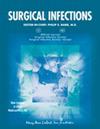因并发腹腔内感染而接受紧急胃肠道手术的重症患者患侵袭性念珠菌病的风险因素。
IF 1.4
4区 医学
Q4 INFECTIOUS DISEASES
引用次数: 0
摘要
背景:念珠菌感染约占医院相关感染的 15%,尤其对重症患者造成致命后果。本研究旨在评估接受手术的重症患者感染侵袭性念珠菌病(IC)的风险因素。患者和方法:我们回顾性审查了2016年1月至2021年12月期间因复杂腹腔内感染而接受急诊手术的583名患者的病历。根据患者住院期间是否出现 IC 将其分为两组。IC定义为经培养证实的念珠菌血症和腹腔内念珠菌病。研究结果本研究纳入了 373 名患者进行最终分析,其中 320 名患者出院时未出现 IC(无 IC 组),53 名患者在住院期间出现 IC(有 IC 组)。出现 IC 组的院内死亡率更高(35.8% 对 8.8%;P < 0.001),66.0% 的患者在入院 10 天内确诊,而只有 6.5% 的患者在入院 20 天后确诊。胃(几率比[OR],4.188;95% 置信区间[CI],1.204-14.561;P = 0.024)和十二指肠(OR,7.595;95% CI,1.934-29.832;P = 0.004)为感染源,急性生理学和慢性健康评价 II(APACHE II)评分较高(OR,1.097;95% CI,1.044-1.152;p < 0.001)和较低的初始收缩压(OR,0.983;95% CI,0.968-0.997;p = 0.018)是急诊胃肠道手术后发生 IC 的危险因素。结论以胃和十二指肠为感染源、APACHE II评分较高、初始收缩压较低的患者在急诊胃肠道手术后住院期间发生IC的风险较高。对于具有这些特征的重症患者,可慎重考虑使用预防性抗真菌药物。本文章由计算机程序翻译,如有差异,请以英文原文为准。
Risk Factors for Invasive Candidiasis in Critically Ill Patients Who Underwent Emergency Gastrointestinal Surgery for Complicated Intra-Abdominal Infection.
Background: Candida species account for approximately 15% of hospital-associated infections, causing fatal consequences, especially in critically ill patients. This study aimed to evaluate invasive candidiasis (IC) risk factors in critically ill patients undergoing surgery. Patients and Methods: We retrospectively reviewed the medical records of 583 patients who underwent emergency surgery for complicated intra-abdominal infections between January 2016 and December 2021. Patients were divided into two groups according to the presence or absence of IC during their hospital stay. IC was defined as culture-proven candidemia and intra-abdominal candidiasis. Results: This study included 373 patients for the final analysis, of whom 320 were discharged without IC (IC absent group) and 53 presented with IC (IC present group) during their hospital stay. The IC present group showed a higher in-hospital mortality rate (35.8 vs. 8.8%; p < 0.001), with 66.0% of the patients diagnosed within 10 days, whereas only 6.5% were diagnosed beyond 20 days after admission. Stomach (odds ratio [OR], 4.188; 95% confidence interval [CI], 1.204-14.561; p = 0.024) and duodenum (OR, 7.595; 95% CI, 1.934-29.832; p = 0.004) as infection origin, higher Acute Physiology and Chronic Health Evaluation II (APACHE II) score (OR, 1.097; 95% CI, 1.044-1.152; p < 0.001), and lower initial systolic blood pressure (OR, 0.983; 95% CI, 0.968-0.997; p = 0.018) were risk factors of IC after emergency gastrointestinal surgery. Conclusions: Patients who had stomach and duodenum as infection origin, higher APACHE II scores, and lower initial systolic blood pressure had a higher risk of developing IC during their hospital stay after emergency gastrointestinal surgery. Prophylactic antifungal agents can be carefully considered for critically ill patients with these features.
求助全文
通过发布文献求助,成功后即可免费获取论文全文。
去求助
来源期刊

Surgical infections
INFECTIOUS DISEASES-SURGERY
CiteScore
3.80
自引率
5.00%
发文量
127
审稿时长
6-12 weeks
期刊介绍:
Surgical Infections provides comprehensive and authoritative information on the biology, prevention, and management of post-operative infections. Original articles cover the latest advancements, new therapeutic management strategies, and translational research that is being applied to improve clinical outcomes and successfully treat post-operative infections.
Surgical Infections coverage includes:
-Peritonitis and intra-abdominal infections-
Surgical site infections-
Pneumonia and other nosocomial infections-
Cellular and humoral immunity-
Biology of the host response-
Organ dysfunction syndromes-
Antibiotic use-
Resistant and opportunistic pathogens-
Epidemiology and prevention-
The operating room environment-
Diagnostic studies
 求助内容:
求助内容: 应助结果提醒方式:
应助结果提醒方式:


